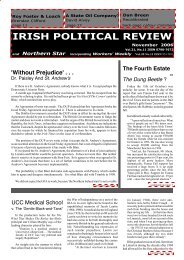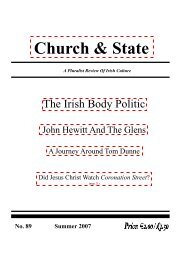Irish Political Review, March 2006 - Athol Books
Irish Political Review, March 2006 - Athol Books
Irish Political Review, March 2006 - Athol Books
Create successful ePaper yourself
Turn your PDF publications into a flip-book with our unique Google optimized e-Paper software.
and O'Higgins) included, couldn't think<br />
coherently about the Border in such a way<br />
as to develop plans for dealing with it.<br />
They could only fantasise about all the<br />
wonderful ways in which it would<br />
suddenly disappear, in not so much a<br />
whiff of grapeshot as a puff of smoke.<br />
Collins was not just living in an illusion of<br />
freedom; there was a delusion of power as<br />
well. (Collins' book, whoever wrote or<br />
cobbled it together, should have been<br />
subtitled, 'How To Win Friends And Get<br />
Them Killed'.)<br />
IRA & NATIONAL ARMY<br />
Until the end of July 1922 all the<br />
Northern divisions of the IRA regarded<br />
the GHQ of the emerging Free State,<br />
National, Army as the one legitimate<br />
military authority in Ireland. They looked<br />
to it for guidance and support. They<br />
reported to it. In previous articles in this<br />
magazine I've quoted bits and pieces of<br />
Seamus Woods' report to GHQ of 20th.<br />
July 1922, detailing the position of the<br />
Belfast Brigade of the 3rd Northern<br />
Division. This is a much fuller version of<br />
the report (as given in Tim Pat Coogan,<br />
op. cit., pp380-382):<br />
"Strength of Brigade - 800 men<br />
Armament: 181 rifles and 11,6000 rounds<br />
of ammunition. 308 service revolvers and<br />
autos, 7,400 rounds of ammunition. 5<br />
Thompson guns and 1,220 rounds of<br />
ammunition.<br />
Engineering material: 156 detonators<br />
12 stone war flour.<br />
20 lbs cheddar. [Home made explosives]<br />
12 lbs gelignite,<br />
20 ft time fuse.<br />
Enemy strength in area:<br />
British military: 5,500<br />
RUC: 2,650<br />
Specials: 26,680<br />
Total 34,830<br />
"For a period of three months previous<br />
to our resuming the offensive the enemy<br />
was running loose murdering and harassing<br />
our people, and as the Army was not very<br />
active the people were gradually losing<br />
the respect they had for the IRA. This<br />
respect had been won, not so much out of<br />
sympathy with our National aspirations,<br />
and our fight for National freedom, but<br />
more on account of the part the Army had<br />
played in defending the minority against<br />
organised attacks by uniformed and nonuniformed<br />
Crown forces.<br />
"When, however, we commenced a<br />
campaign of destruction of enemy property<br />
which hit the authors and promoters of the<br />
pogrom, and was having the effect of<br />
stopping the murder campaign, the<br />
sympathy and support of the people was<br />
slowly coming back to us.<br />
"As I have already reported to GHQ there<br />
was a small Executive [the anti-treaty Four<br />
Courts Executive, JK] following in Belfast<br />
and on the 31st May they attempted to<br />
shoot two Specials. Most of our<br />
officers…were attending a Brigade<br />
Meeting when this happened, and before<br />
20<br />
they could get back to their areas the<br />
Specials ran amok, and shot up practically<br />
every Catholic area in the City; the death<br />
toll for that day was twelve and upwards of<br />
50 were wounded. This was the hardest<br />
blow the civil population had got, and it<br />
almost broke their morale. Notwithstanding<br />
that we kept up our campaign of<br />
burning, and in a short time the enemy<br />
realised that they would require to change<br />
their tactics. They set about establishing a<br />
series of block-houses throughout our<br />
areas, and selected their men especially<br />
with a view to fraternising with the Catholic<br />
population.<br />
"This policy has met with great<br />
success as the people war-worn and long<br />
tired were glad of an opportunity of<br />
peace. Unfortunately however, the anti-<br />
<strong>Irish</strong> element of the population are taking<br />
advantage of the situation and are giving<br />
all available scraps of information to the<br />
enemy. Several of our dumps have been<br />
captured within the last few weeks, and<br />
in practically every case the raiding party<br />
went direct to the house.<br />
"…many officers and men are forced<br />
to go on the run, necessarily in their own<br />
restricted areas. They find it difficult to<br />
get accommodation with the people now<br />
and in a particular area, seventeen of our<br />
best officers and men had to sleep in a<br />
refugee home where they were all<br />
captured.<br />
"The enemy are continually raiding<br />
and arresting; the heavy sentences and<br />
particularly the 'floggings' making the<br />
civilians very loath to keep 'wanted men'<br />
or arms. The officers are feeling their<br />
position keenly. Recently a number of<br />
men were rounded up and detained in<br />
custody. The mother of one of the boys<br />
when bringing him food shouted out, in<br />
the presence of Crown forces, the name<br />
of the local o/c and made a tirade against<br />
him for misleading her boy into this<br />
movement.<br />
"As I have mentioned before the<br />
economic position is very acute. To give<br />
a rough idea there are 171 married men<br />
with 405 dependants and 346 single men<br />
with 936 dependants. These figures are<br />
taken from cards returned by each<br />
company and where there were two<br />
brothers the number of dependants was<br />
divided. To relieve the situation it would<br />
require a grant of say £500 per week.<br />
"The men are in a state of practical<br />
starvation and continually making<br />
applications for transfer to Dublin to<br />
join the 'Regular Army'…under the<br />
present circumstances it would be<br />
impossible to keep our Military<br />
Organisation alive and intact, as the<br />
morale of the men is going down day by<br />
day and the spirit of the people is<br />
practically dead."<br />
That report was sent in to GHQ just a<br />
week or so before the campaign was called<br />
off, but the material circumstances were<br />
not so different when the campaign began.<br />
The Belfast Brigade then had 400 more<br />
men and not very much more in the way of<br />
arms and equipment. And Collins knew<br />
the position at the beginning as at the end<br />
of the campaign.<br />
In April, at the North-East Advisory<br />
Committee meeting, Bishop MacRory told<br />
him: "I can assure you that if you burn<br />
houses you will intensify the slaughter<br />
and the men who do the burning will have<br />
to run away and hide". And the Belfast<br />
commander, O/C of the 3rd Northern<br />
Division, Seamus Woods told him at the<br />
same time: "Sooner or later we will have<br />
to clear out of Belfast". But Collins simply<br />
would not be told and went ahead with it.<br />
THE ASSAULT<br />
What Collins had decided to go ahead<br />
with, come what may, went ahead in the<br />
first instance in the 3rd Northern Division<br />
area on May 17th (the date given by<br />
Staunton, Coogan says it was May 18th).<br />
Not the best laid of plans, it went awry<br />
from the word go. The Belfast Brigade<br />
attacked Musgrave Street Barracks as<br />
planned on May 17th but the Down<br />
Brigade which was to have mounted simultaneous<br />
attacks was held up for two days.<br />
(It was in turmoil because its commander,<br />
Patrick Fox, and a strong minority of the<br />
rank and file had switched allegiance to<br />
the Four Courts Executive.)<br />
According to Enda Staunton:<br />
"The delay in the case of the No. 3<br />
Brigade in Down meant this area was<br />
soon flooded with Special Constabulary<br />
from Newry. As Newry lay within the<br />
4th Northern Divisional area, Woods<br />
sent his second in command to see the<br />
Chief of Staff [of the Northern Military<br />
Council, JK], Frank Aiken, who<br />
promised to commence operations. As<br />
McCorley later recalled, the 4th Northern<br />
failed to go off while the 2nd Northern,<br />
comprising the Mid-Ulster area, went<br />
off too soon. Woods kept the men in<br />
Antrim and Down 'under arms' in the<br />
hope of reinforcements. When these<br />
failed to materialise he gave the order to<br />
disband. With the introduction of the<br />
most sweeping provision of the Special<br />
Powers Act on 20 May, internment, and<br />
over 400 IRA suspects lifted, the<br />
movement was firmly on the defensive.<br />
After that it was downhill all the way for<br />
his Division, the 3rd Northern. Brigades<br />
Nos 2 and 3 were virtually destroyed<br />
within five weeks by demoralisation.<br />
No 1, Belfast itself, remained active<br />
through May and June, the campaign of<br />
incendiarism discussed by the Ulster<br />
Advisory Committee and by the cabinet<br />
continuing until the government called<br />
it off in July. In June alone 85 burnings<br />
were carried out. But defeat was on the<br />
way for the IRA in the city. Having<br />
braved the ferocity of the northern State,<br />
the attitude of its own people was to be<br />
the rock on which it finally perished"<br />
(The Nationalists Of Northern Ireland,<br />
1918-1973, pp66-67).<br />
So, assuming that the point of it all was<br />
not to fulfil some secret deal with the<br />
British by destroying the Northern IRA,<br />
what could have been the point of the<br />
campaign which destroyed the Northern<br />
IRA?




